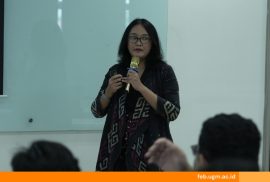The Microeconomics Dashboard (Micdash) of the Faculty of Economics and Business, Universitas Gadjah Mada, has released its latest study titled “Labor and Technology Economics: Will Artificial Intelligence Fully Replace Humans?”. This research delves into the influence of technological innovation and the advancement of Artificial Intelligence (AI) on the labor market.
Qisha Quarina, S.E., M.Sc., Ph.D., Coordinator of Micdash, explained that the adoption of AI technology is rapidly increasing. She emphasized that AI is expected to significantly impact employment by simplifying information retrieval and human resource management while enhancing productivity through better worker monitoring.
The emergence of AI technology presents complex dynamics. On the one hand, it offers numerous benefits. Still, it raises concerns about replacing human jobs with machines and robots and the growing gap between the skills workers possess and those demanded by the labor market.
Qisha noted that 77% of people are worried that AI could eliminate jobs and replace their tasks. “This concern arises because AI can optimize work and address human resource limitations,” she stated on Monday (December 2, 2024).
However, she emphasized that AI must still work on tasks involving unpredictability or outside predefined knowledge areas.
“The education sector and companies should facilitate skills upgrading and reskilling programs to help workers remain competitive in the future and ensure their relevance in an increasingly digital job market,” she added.
Another Micdash researcher, Raniah Salsabila, S.E., pointed out that integrating AI in the labor market is inevitable, as this innovation is fundamentally designed to help humans perform tasks and increase productivity.
“ChatGPT is used to support research, edit documents, and generate ideas more efficiently. This shows that AI doesn’t replace humans, but rather certain skills needed to improve work efficiency,” Raniah explained.
She emphasized that the benefits of AI can be maximized if workers are equipped to adapt to technological developments. Future skills will not only revolve around technology but also include human intelligence, such as analytical thinking and innovation, complex problem-solving, critical thinking and analysis, creativity, originality, initiative, reasoning, problem-solving, and creativity.
“These skills are becoming increasingly important. While AI can perform specific tasks, it cannot replace qualities rooted in human intelligence,” Raniah concluded.
Source: Micdash FEB UGM
Writer: Shofi Hawa Anjani
Editor: Kurnia Ekaptiningrum
Photo: Generated with Copilot
Sustainable Development Goals








